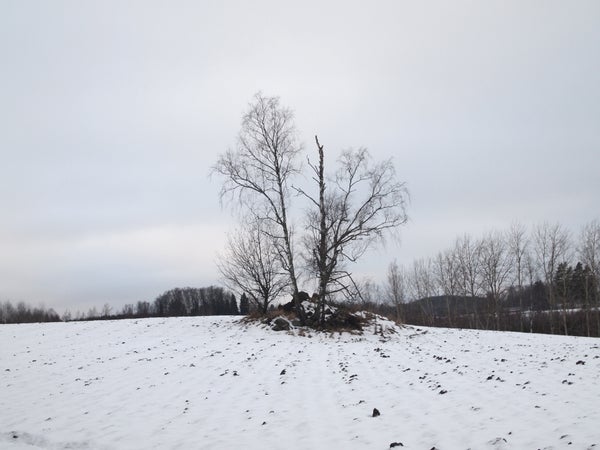This article was published in Scientific American’s former blog network and reflects the views of the author, not necessarily those of Scientific American
I recently found myself leaning on a rail that separated me from the mighty Hudson River. It was dusk, the end of a cold, cloudy day. As the sky behind the Manhattan skyline faded from gray to black, the lights on the spires of the Empire State Building and Freedom Tower gleamed more brightly.
So I thought. I even came up with an aphorism: “The darker the sky, the brighter the lights.” Then I realized what I was doing. Nice try, I chided myself, but that’s pathetic, you’re grasping at epiphanies.
These dark days are getting me down. I try to maintain a bright outlook, as a matter of principle. I brainwash myself with pep talks about how terrific life is, life in general and mine in particular. I remind myself of all I should be grateful for. A good job, healthy son and daughter, girlfriend who only occasionally finds me annoying. I get to write about things I care about. But the darkness is seeping into me.
On supporting science journalism
If you're enjoying this article, consider supporting our award-winning journalism by subscribing. By purchasing a subscription you are helping to ensure the future of impactful stories about the discoveries and ideas shaping our world today.
Perhaps I’m just regressing to the mean. Last summer I kicked my caffeine habit and went on a silent meditation retreat, lifting my mood for months. My post-retreat afterglow had to fade eventually. And maybe I’m succumbing to seasonal affective disorder. Friends have urged me to try light therapy or vitamin D, but the evidence that these treatments work is slim.
Also, I have good reasons for being glum. I’m 65 years old, on the downslope of life, and civilization, too, seems to be descending. Bill McKibben, the environmental writer/activist, wonders in a recent essay what it will take for us to take climate change seriously. The planet keeps giving us warning signs--fires, droughts, heat waves, floods, storms, melting ice caps, rising seas, vanishing species--and yet we continue blithely skipping down “a path to self-destruction.” McKibben assures us, dutifully, that “there is nothing inevitable about our fate,” but his essay is less call to action than cry of despair.
“Cry of despair” also describes a book of photographs sitting on a table in my living room, MAIN STRƎƎT: The Lost Dream of Route 66. Edward Keating, a Pulitzer-winning photographer and old friend, spent more than a decade shooting people and places along Route 66, the legendary highway that loops from Chicago down through Texas and out to Los Angeles. In an afterword Keating says that, given what he saw, he wasn’t surprised by the populist revolt that led to “our current crisis in leadership.” He only wondered why it took so long to happen.
Keating’s photos, which move from east to west, show tough, lonely men, women and children, white, black, Hispanic, Native American, in motels, trailer parks, bars, gas stations, laundromats. The stark beauty of the settings offsets the solitude and sadness of the people, a little, but the realism is almost too much to bear. The last photograph shows a homeless, faceless person curled up under a blanket in Santa Monica beach, end of the road. No other human is visible. The streetlights in the background make the night seem blacker.
To counter my melancholy, I tell myself what I tell my students when they seem down. Life is much better for us than it was for our ancestors. We’re healthier, wealthier, freer, more peaceful. Yeah, we have problems, but we’re moving in the right direction. These arguments fall flat now, they have no emotional force. They can’t dispel the darkness I feel looking at Keating’s images, reading McKibben’s words.
“For the past few years,” McKibben writes, “a tide of optimistic thinking has held that conditions for human beings around the globe have been improving. Wars are scarcer, poverty and hunger are less severe, and there are better prospects for wide-scale literacy and education. But there are newer signs that human progress has begun to flag. In the face of our environmental deterioration, it’s now reasonable to ask whether the human game has begun to falter—perhaps even to play itself out.”
Rather than resisting, I’ve been trying to face the darkness, with mixed success. Last Sunday my daughter Skye took subways all the way from Brooklyn, where she lives, to Hoboken. We found a local church selling Christmas trees, and Skye helped me pick out a fir. It’s not big, no taller than me, but it has a nice shape, and it smells good. After we set up the tree, I watched Skye wrap colored lights around it.
By the time Skye left, the sun had set, and I started feeling sad again. So I turned off all the lights in my apartment except those on the tree. Then I sat on the couch and looked at the tree. In the dark, the lights shine brighter.
Further Reading:
Noam Chomsky Calls Trump and Republican Allies "Criminally Insane"
Should We Chill Out about Global Warming?
Climate Change: Facts Versus Opinions
Seeing the Miracle of Existence in the Darkest of Times
Why You Should Choose Optimism
Yes, Trump Is Scary, but Don't Lose Faith in Progress
